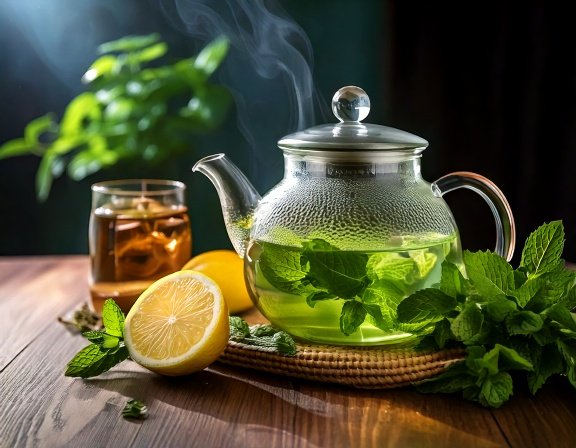Peppermint Tea Benefits for Digestion & Year-Round Wellness
From cooling teas to soothing steams—learn how peppermint supports digestive balance, seasonal immunity, and everyday vitality.

Fresh Peppermint Tea for Digestion & Calm
Peppermint tea is the simplest, most refreshing way to harness this herb’s digestive and soothing benefits. Its aroma clears the mind while menthol cools the body and relieves post-meal discomfort.
Ingredients
- 1 small handful fresh peppermint leaves (or 1–2 tsp dried)
- 1 cup hot (not boiling) water
- Optional: lemon slice or honey drizzle
How to Make
- Lightly crush leaves to release aroma.
- Pour hot water, cover, and steep 5–10 minutes.
- Strain and sip slowly after meals for digestive comfort.
Tip: Chill and serve over ice for a refreshing summer tonic.
Finessa — Plant-Based Gut & Liver Support
- Contains Taraxacum, Silymarin (Milk Thistle), Cascara, Cynara (Artichoke), Turmeric, Licorice, and Probiotics
- High in polyphenols for natural cleansing and detox support
- Crafted for gentle digestion and total body balance
Affiliate disclosure: Purchases through this link may earn a small commission at no extra cost to you.
Year-Round Uses for Peppermint Wellness
Peppermint adapts to every season—refreshing in summer, comforting in winter. Its cooling nature reduces heat stress and supports clear breathing during cold months.
- Spring & Summer: Brew iced peppermint tea with lemon for hydration and detox.
- Fall & Winter: Use warm tea or steam to ease congestion and indigestion.
- Anytime: Add fresh leaves to salads, smoothies, or desserts for a digestive lift.
Harvest leaves in the morning for peak aroma and dry extras to enjoy all year long.
Did You Know?
Ancient Egyptians used peppermint to aid digestion over 3,000 years ago. Victorians carried mint leaves to revive the mind and freshen the air on long walks.
Ready to feel the power of peppermint?
Subscribe for More
References
- McKay D.L., Blumberg J.B. (2006). “A Review of the Bioactivity and Potential Health Benefits of Peppermint Tea.” Phytotherapy Research.
- National Center for Complementary and Integrative Health: Peppermint Monograph.
- Kligler B., Chaudhary S. (2007). “Peppermint Oil.” American Family Physician.
Content for informational purposes only — not a substitute for medical advice. Consult your health provider before use.